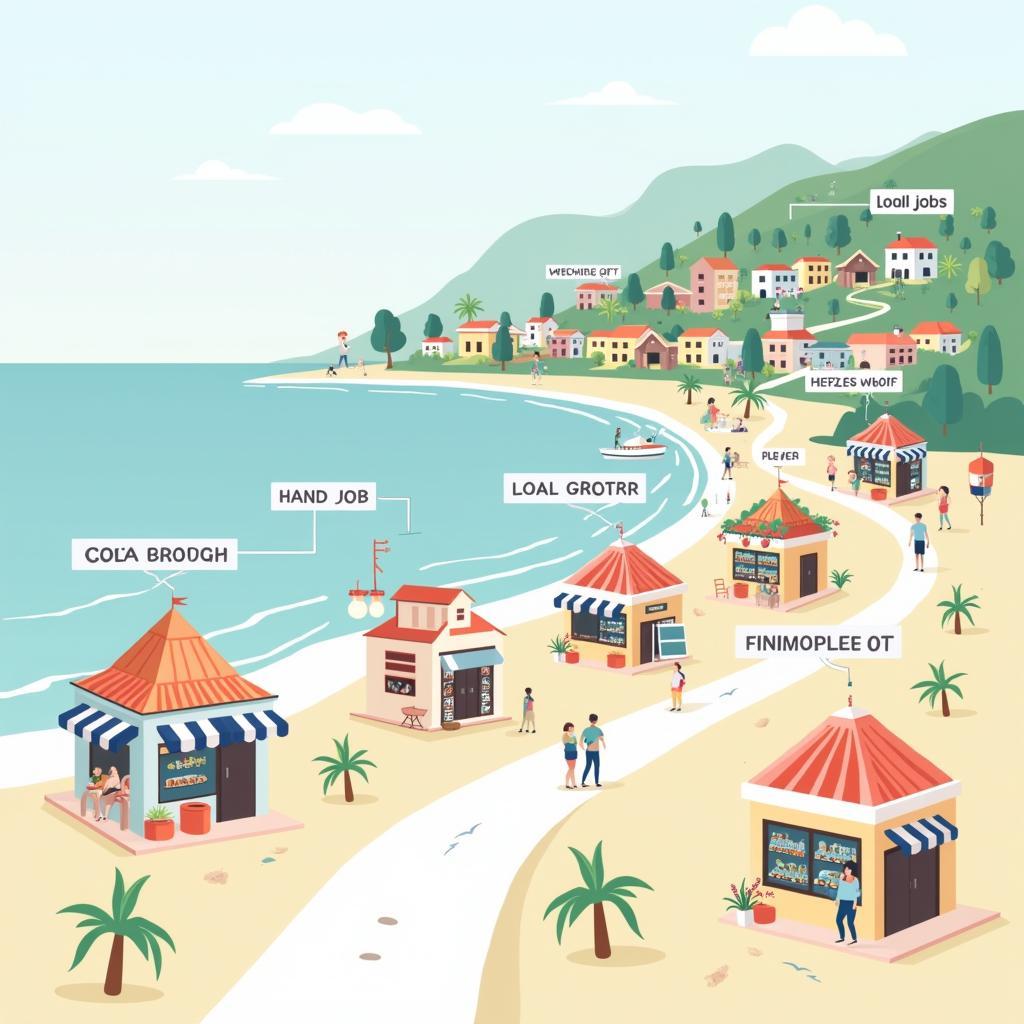Mở bài
Chủ đề The Role Of Tourism In Boosting Local Economies xuất hiện với tần suất cao trong IELTS Writing Task 2 vì du lịch là ngành kinh tế mũi nhọn ở nhiều quốc gia, đồng thời gây tranh luận về tác động môi trường – văn hóa. Trong bài viết này, bạn sẽ học: 3 bài mẫu hoàn chỉnh (Band 5-6, 6.5-7, 8-9), phân tích chấm điểm chi tiết theo 4 tiêu chí, bộ từ vựng – cấu trúc “ăn điểm”, cùng checklist thực hành. Tôi cũng chỉ ra lỗi người Việt hay mắc (mạo từ, thì, giới từ) và chiến lược triển khai luận điểm mạch lạc.
Một số câu hỏi thực tế (được ghi nhận rộng rãi trên các nguồn uy tín như IELTS Liz, IELTS-Blog, British Council/IDP materials) liên quan đến chủ đề này:
- Tourism brings economic benefits to local communities but also causes environmental and social problems. Do the advantages outweigh the disadvantages?
- Some people believe that international tourism is harmful to local cultures. Others think it is beneficial. Discuss both views and give your opinion.
- Tourism is one of the fastest-growing industries. What are the advantages and disadvantages for local people?
Bài viết tập trung phân tích sâu một đề “Discuss both views + opinion” – dạng bài phổ biến và có độ phân hóa cao trong chấm điểm.
 Vai trò của du lịch trong boosting local economies và mẹo viết IELTS Task 2
Vai trò của du lịch trong boosting local economies và mẹo viết IELTS Task 2
1. Đề Writing Part 2
Some people believe that tourism brings substantial economic benefits to local communities, while others think it causes social and environmental problems. Discuss both views and give your own opinion.
Dịch đề: Một số người tin rằng du lịch đem lại lợi ích kinh tế đáng kể cho cộng đồng địa phương, trong khi những người khác cho rằng nó gây ra các vấn đề xã hội và môi trường. Hãy thảo luận cả hai quan điểm và đưa ra ý kiến của bạn.
Phân tích đề bài:
- Dạng câu hỏi: Discuss both views + give your opinion. Bạn phải:
- Trình bày công bằng cả hai quan điểm (ưu – nhược).
- Khẳng định quan điểm cá nhân rõ ràng, nhất quán.
- Thuật ngữ quan trọng:
- “substantial economic benefits”: lợi ích kinh tế lớn (việc làm, thu nhập, thuế, hiệu ứng lan tỏa).
- “social and environmental problems”: quá tải hạ tầng, tăng giá, thương mại hóa văn hóa, ô nhiễm, rác thải, mùa vụ.
- Lỗi thường gặp:
- Không cân bằng hai luận điểm, viết thiên kiến.
- Thiếu ví dụ cụ thể ở cấp độ địa phương (local communities).
- Lạm dụng từ “develop”/“increase”; dùng sai mạo từ (a/an/the) và giới từ.
- Cách tiếp cận chiến lược:
- Mở bài: nêu bối cảnh + paraphrase đề + lập trường.
- Thân bài 1: Vai trò kinh tế (jobs, income, multiplier effect, SME growth, heritage revitalisation).
- Thân bài 2: Mặt trái (overtourism, seasonality, cultural commodification) + giải pháp (tax levy, carrying capacity, community-based tourism).
- Kết bài: Cân bằng – lợi ích thắng thế khi được quản trị tốt.
2. Bài mẫu Band 8-9
Bài Band 8-9 cần lập luận sâu, ví dụ xác tín, từ vựng học thuật chính xác, câu phức đa dạng, và liên kết mạch lạc.
Bài luận (298 từ):
Tourism has become a linchpin of many regional economies, and few would dispute its capacity to inject spending into host communities. In my view, the economic upsides are substantial, yet they only endure when destinations actively manage social and environmental externalities.
On the one hand, tourism generates layered benefits that ripple through local markets. Direct employment in hospitality and transport is matched by indirect demand for farmers, artisans and construction workers, producing a multiplier effect that can revitalise struggling towns. When visitors pay entrance fees or city taxes, municipalities can channel revenue into heritage conservation and public services. Moreover, small and family-run enterprises—guesthouses, street-food vendors and craft ateliers—often capture a significant share of tourist expenditure, thereby boosting local economies rather than enriching distant conglomerates.
On the other hand, unmanaged growth brings costs. Overtourism strains water and waste systems, erodes fragile ecosystems and inflates rents, which may displace residents. Culture can be commodified when performances are staged to satisfy demand rather than to transmit meaning, weakening community identity. Seasonality also creates precarious jobs. Notwithstanding these risks, evidence from community-based tourism suggests that impacts can be mitigated: governments can set carrying-capacity limits, impose environmental levies and require local ownership stakes; businesses can diversify products beyond peak months; travellers can be nudged toward slower, lower-impact experiences.
In conclusion, the role of tourism in boosting local economies is undeniable, but prosperity should not be pursued at the expense of social cohesion or natural assets. If stakeholders align incentives—through smart regulation, transparent reinvestment and resident participation—tourism’s economic engine can run cleanly and inclusively, transforming short-term cash flows into long-term community resilience.
Phân tích Band điểm
| Tiêu chí | Band | Nhận xét |
|---|---|---|
| Task Response (Hoàn thành yêu cầu) | 8.5 | Trả lời đầy đủ cả hai mặt, lập trường rõ ràng và xuyên suốt. Có giải pháp và điều kiện giúp lợi ích bền vững, phát triển ý sâu, ví dụ cụ thể ở cấp độ địa phương. |
| Coherence & Cohesion (Mạch lạc & Liên kết) | 8.5 | Bố cục 4 đoạn rõ ràng; câu chủ đề nổi bật; sử dụng logical sequencing (on the one hand/on the other hand, Notwithstanding). Liên kết nội bộ đoạn chặt chẽ, không lạm dụng từ nối. |
| Lexical Resource (Từ vựng) | 8.5 | Từ vựng học thuật phong phú: multiplier effect, commodified, carrying-capacity limits, environmental levies. Collocations tự nhiên; kiểm soát sắc thái tốt, không lặp từ. |
| Grammatical Range & Accuracy (Ngữ pháp) | 8.0 | Câu phức đa dạng, mệnh đề nhượng bộ, cụm phân từ. Chính xác cao; dấu câu chuẩn; nếu có lỗi chỉ là rất nhỏ, không ảnh hưởng hiểu. |
Các yếu tố giúp bài này được chấm điểm cao
- Luận điểm mở bài định vị điều kiện: lợi ích chỉ “endure when managed” → quan điểm tinh tế.
- Dùng khái niệm kinh tế cụ thể (multiplier effect, local capture of expenditure), không nói chung chung.
- Đối trọng lợi ích – rủi ro có giải pháp “khóa” vào stakeholder: chính quyền, doanh nghiệp, du khách.
- Collocations tự nhiên, học thuật: impose environmental levies, channel revenue, align incentives.
- Câu chủ đề đỏ dễ nhận biết, điều hướng độc giả; mỗi đoạn triển khai một trục ý rõ ràng.
- Kết bài nhấn mạnh “prosperity vs social/environmental trade-offs” → tư duy đánh đổi chính sách.
- Dẫn chứng điển hình “community-based tourism” làm cầu nối luận điểm và giải pháp.
3. Bài mẫu Band 6.5-7
Đặc điểm: Lập luận đủ ý, từ vựng khá, vẫn còn một số chỗ diễn đạt chưa tinh, ví dụ chưa thật sắc.
Bài luận (262 từ):
Tourism is often presented as a quick way to improve local economies because it creates jobs and brings new money to towns and villages. I agree that the benefits are real, but they should be balanced with careful planning to avoid long-term damage.
First, visitors spend on hotels, food and transport, which directly supports local workers. This demand also helps farmers, shop owners and small service providers, so the impact is wider than the tourism sector itself. In some places, ticket fees and taxes from tourists allow the authorities to repair roads, protect historical buildings and organize festivals that also benefit residents. As a result, tourism can boost local economies by creating both direct and indirect income streams.
However, problems appear when destinations grow too fast. Popular sites may suffer from pollution and traffic jams, and prices can rise, making life harder for local people. Cultural shows may become “performances for visitors” rather than authentic traditions. In addition, many tourism jobs are seasonal and can disappear during low months or crises like a pandemic. To reduce these risks, governments should set limits for visitor numbers, collect environmental fees, and support community-based projects so that residents gain more control and profit.
In conclusion, tourism can be a powerful engine for development, but only if it is managed responsibly. When planning considers environmental limits and local voices, economic benefits are more likely to last.
Phân tích Band điểm
| Tiêu chí | Band | Nhận xét |
|---|---|---|
| Task Response (Hoàn thành yêu cầu) | 7.0 | Nêu đủ hai phía và có ý kiến; ví dụ khá cụ thể nhưng chưa sâu vào cơ chế (ví dụ “how tax is reinvested” còn chung). |
| Coherence & Cohesion (Mạch lạc & Liên kết) | 7.0 | Cấu trúc rõ và chuyển đoạn hợp lý; từ nối đủ dùng. Một số câu kết đoạn có thể mạnh hơn để nhấn mạch lập luận. |
| Lexical Resource (Từ vựng) | 6.5 | Dùng từ đúng chủ đề (environmental fees, community-based), nhưng collocations chưa đa dạng; vài chỗ lặp từ “benefits,” “local.” |
| Grammatical Range & Accuracy (Ngữ pháp) | 7.0 | Câu phức vừa phải, chính xác nhìn chung. Vẫn thiên về cấu trúc an toàn, ít biến hóa nâng cao. |
So sánh với bài Band 8-9
- Bài 8-9 có thuật ngữ chuyên sâu (multiplier effect, align incentives), bài 6.5-7 dùng từ phổ thông hơn.
- Bài 8-9 phân tích cơ chế và điều kiện (“when incentives align”), bài 6.5-7 dừng ở giải pháp tổng quát.
- Tổ chức luận cứ của bài cao hơn có chủ đề đoạn sắc nét, kết nối chặt giữa lợi ích – rủi ro – biện pháp.
4. Bài mẫu Band 5-6
Đặc điểm: Có ý nhưng phát triển chưa sâu; lỗi mạo từ, chia thì, giới từ; liên kết hạn chế; từ vựng lặp và đôi chỗ không tự nhiên.
Bài luận (258 từ):
Many people say tourism bring money and jobs for local people, but others think it makes problems to society and environment. In the other hand, I believe it is more good if government control it.
Firstly, tourists spend on hotel, foods and souvenirs, so local business grow. It also create jobs for young people who do not have many chances. An huge number of small shops are opened because of tourists, and city can collect more tax. This money can use to fix road and build public place. Therefore, tourism help the economy a lot.
However, there are many negative. Streets become crowded and dirty, and the price is increasing so local people cannot buy thing easily. Traditional culture sometimes is changed only for show to visitors. Some workers are depends on season and lose income when it is low season. Government should control strictlyly by put limit for visitors and ask tourist to pay a environment fee.
In conclusion, tourism has advantage and disadvantage, but it can be more better if we manage it well. The role of tourism in boosting local economies is important, and people and government must work together to make it sustainable.
Phân tích Band điểm
| Tiêu chí | Band | Nhận xét |
|---|---|---|
| Task Response (Hoàn thành yêu cầu) | 5.5 | Có nêu hai mặt và nêu ý kiến, nhưng lý lẽ đơn giản, ví dụ mơ hồ, ít khai triển nguyên nhân – kết quả. |
| Coherence & Cohesion (Mạch lạc & Liên kết) | 5.5 | Có các đoạn cơ bản; từ nối nghèo nàn; lặp ý; một số câu chuyển ý đột ngột. |
| Lexical Resource (Từ vựng) | 5.5 | Từ vựng hạn chế, lặp “tourism, money, problem”; collocation sai tự nhiên (“control strictlyly”). |
| Grammatical Range & Accuracy (Ngữ pháp) | 5.0 | Nhiều lỗi mạo từ, chia động từ, giới từ; một số cấu trúc sai (“in the other hand”, “more better”). |
Những lỗi sai của bài – phân tích & giải thích
| Lỗi sai | Loại lỗi | Sửa lại | Giải thích |
|---|---|---|---|
| tourism bring | Chia động từ | tourism brings | Chủ ngữ ngôi 3 số ít → thêm -s. |
| In the other hand | Cụm cố định | On the other hand | Thành ngữ đúng là “On the other hand”. |
| An huge number | Mạo từ | A huge number | “huge” phụ âm đầu → dùng “a”. |
| tourism help the economy | Chia động từ | tourism helps the economy | Ngôi 3 số ít. |
| the price is increasing | Collocation | prices are rising | Giá cả số nhiều + collocation tự nhiên. |
| are depends on season | Ngữ pháp | are dependent on the season | “be dependent on”. |
| control strictlyly | Trạng từ | control strictly | “strictly” là trạng từ; không có “strictlyly”. |
| put limit for visitors | Giới từ/cụm | put a limit on visitors | Collocation: put a limit on. |
| a environment fee | Mạo từ | an environmental fee | Nguyên âm đầu + tính từ “environmental”. |
| more better | So sánh | better | Không dùng “more” với “better”. |
Cách Cải Thiện Từ Band 6 Lên Band 7
- Mở rộng luận cứ bằng cơ chế: giải thích “tiền du lịch” chảy qua những kênh nào (thu thuế, dịch vụ phụ trợ).
- Dùng collocations chính xác: impose a levy, set visitor caps, boost local economies.
- Tăng tính mạch lạc: mỗi đoạn một ý chính; câu chủ đề rõ ràng; thêm câu giải thích – ví dụ – kết nối.
- Sửa lỗi hệ thống: mạo từ (a/an/the), chia động từ ngôi 3 số ít, giới từ cố định (on, to, for, of).
- Đa dạng cấu trúc: mệnh đề nhượng bộ, câu điều kiện, cụm phân từ để nâng điểm ngữ pháp.
5. Từ vựng quan trọng cần nhớ
| Từ/Cụm từ | Loại từ | Phiên âm | Nghĩa tiếng Việt | Ví dụ (tiếng Anh) | Collocations |
|---|---|---|---|---|---|
| multiplier effect | n. | /ˈmʌltɪˌplaɪər ɪˈfekt/ | hiệu ứng số nhân | Tourism can create a multiplier effect in rural towns. | create/trigger a multiplier effect |
| overtourism | n. | /ˌoʊvərˈtʊrɪzəm/ | du lịch quá tải | Overtourism strains local infrastructure. | tackle/curb overtourism |
| carrying capacity | n. | /ˈkæriɪŋ kəˈpæsəti/ | sức chứa bền vững | Parks must define their carrying capacity. | define/set carrying capacity |
| environmental levy | n. | /ɪnˌvaɪrənˈmɛntl ˈlɛvi/ | phí môi trường | The city imposed an environmental levy on visitors. | impose/collect an environmental levy |
| cultural commodification | n. | /kʌlʧərəl kəˌmɒdɪfɪˈkeɪʃən/ | thương mại hóa văn hóa | Cultural commodification can dilute traditions. | lead to/avoid cultural commodification |
| community-based tourism | n. | /kəˈmjuːnəti beɪst ˈtʊrɪzəm/ | du lịch dựa vào cộng đồng | Community-based tourism keeps profits local. | develop/support community-based tourism |
| boost local economies | v. phr. | /buːst ˈloʊkəl ɪˈkɒnəmiz/ | thúc đẩy kinh tế địa phương | Festivals can boost local economies. | significantly/substantially boost local economies |
| diversify income | v. phr. | /daɪˈvɜːrsɪfaɪ ˈɪnkʌm/ | đa dạng hóa nguồn thu | Operators diversify income to reduce seasonality. | diversify income streams |
| stakeholder | n. | /ˈsteɪkˌhoʊldər/ | bên liên quan | Stakeholders must align their incentives. | engage/consult stakeholders |
| revitalise (revitalize) | v. | /riːˈvaɪtəlaɪz/ | hồi sinh, phục hồi | Tourism can revitalise old neighbourhoods. | revitalise heritage/sites |
| spillover benefits | n. | /ˈspɪlˌoʊvər ˈbɛnɪfɪts/ | lợi ích lan tỏa | There are spillover benefits for farmers. | generate/capture spillover benefits |
| seasonal employment | n. | /ˈsiːzənl ɪmˈplɔɪmənt/ | việc làm theo mùa | Seasonal employment is unstable. | rely on seasonal employment |
| price inflation | n. | /praɪs ɪnˈfleɪʃən/ | lạm phát giá | Tourism can cause local price inflation. | drive/trigger price inflation |
| align incentives | v. phr. | /əˈlaɪn ɪnˈsɛntɪvz/ | đồng bộ hóa động lực | Policies should align incentives across stakeholders. | better/closely align incentives |
| by the same token | linker | /baɪ ðə seɪm ˈtoʊkən/ | tương tự, cùng lý do | By the same token, residents deserve a share. | By the same token, … |
[internal_link: Collocations cho chủ đề Environment trong IELTS Writing]
[internal_link: Cách viết Discuss Both Views trong IELTS Task 2]
6. Cấu trúc câu dễ ăn điểm cao
- Câu phức với mệnh đề phụ thuộc
- Công thức: Mệnh đề chính + when/if/because/although + mệnh đề phụ.
- Ví dụ (trích Band 8-9): …they only endure when destinations actively manage social and environmental externalities.
- Vì sao ghi điểm: Diễn đạt điều kiện/nhượng bộ rõ ràng, tăng logic.
- Ví dụ bổ sung: Although visitor numbers are rising, waste systems remain underfunded. If levies are transparent, residents are more supportive.
- Lỗi thường gặp: Thiếu “s” ngôi 3; dùng sai although/but cùng lúc.
- Mệnh đề quan hệ không xác định (non-defining relative clause)
- Công thức: Danh từ, which/who + mệnh đề phụ giải thích, …
- Ví dụ: municipalities can channel revenue into heritage conservation, which strengthens local pride.
- Ghi điểm: Bổ sung thông tin mượt, giúp câu dài nhưng rõ.
- Ví dụ thêm: Tourism, which many towns depend on, must be regulated. Visitors, who are increasingly eco-conscious, welcome levies.
- Lỗi: Quên dấu phẩy; dùng “that” thay “which” trong mệnh đề không xác định.
- Cụm phân từ (participle phrase)
- Công thức: V-ing/V-ed + cụm, bổ nghĩa cho mệnh đề.
- Ví dụ: producing a multiplier effect that can revitalise struggling towns.
- Ghi điểm: Nén thông tin, tăng linh hoạt.
- Ví dụ: Raising prices during peak months, hotels can stabilise revenue. Burdened by traffic, residents lose patience.
- Lỗi: Treo chủ ngữ (dangling participle) khiến hiểu sai.
- Câu chẻ (Cleft sentences)
- Công thức: It is/was + X + that/who + mệnh đề.
- Ví dụ: It is community-based tourism that ensures profits stay local.
- Ghi điểm: Nhấn trọng tâm thuyết phục.
- Ví dụ: It is the multiplier effect that policymakers often overlook. It is residents who bear the hidden costs.
- Lỗi: Sai thì; lặp quá nhiều gây gượng gạo.
- Câu điều kiện nâng cao (Type 2/3; Mixed)
- Công thức: If + V2, would + V; If + had V3, would have + V3…
- Ví dụ: If stakeholders align incentives, tourism’s engine can run cleanly and inclusively. (điều kiện thực tế gần)
- Ghi điểm: Thể hiện giả định chính sách, tư duy phản biện.
- Ví dụ: If cities had set caps earlier, damage would have been limited. If fees were ring-fenced, trust would grow.
- Lỗi: Sai thì động từ; dùng “will” sau “if” ở loại 2/3.
- Đảo ngữ (Inversion)
- Công thức: Only by/Not until/Hardly… + trợ động + S + V
- Ví dụ: Only when tourism is governed transparently do its benefits outweigh its costs.
- Ghi điểm: Tạo nhấn mạnh học thuật, linh hoạt cấu trúc.
- Ví dụ: Not until levies were introduced did congestion ease. Seldom do visitors see the hidden costs.
- Lỗi: Quên đảo trợ động; dùng sai thì sau cụm dẫn.
7. Checklist Tự Đánh Giá
- Trước khi viết:
- Xác định dạng bài: Discuss both views + opinion.
- Brainstorm theo 3 trục: lợi ích kinh tế – chi phí xã hội/môi trường – giải pháp quản trị.
- Chọn 2 luận điểm mạnh nhất cho mỗi phía + ví dụ địa phương.
- Trong khi viết:
- Mở bài: paraphrase + lập trường rõ.
- Mỗi đoạn thân: 1 câu chủ đề + giải thích + ví dụ + mini-kết.
- Dùng 2-3 collocations chủ đề; 1-2 cấu trúc nâng cao.
- Sau khi viết:
- Soát mạo từ (a/an/the), “s” ngôi 3, giới từ cố định (on/for/of).
- Cắt lặp từ; thay bằng đồng nghĩa chính xác.
- Kiểm tra số từ: 270-320 từ cho an toàn.
- Mẹo quản lý thời gian:
- 2-3 phút phân tích đề; 5 phút dàn ý; 25 phút viết; 5 phút soát lỗi.
- Viết câu chủ đề trước để tránh lạc đề; đặt timer ở phút 20 để kịp kết bài.
 Chiến lược viết IELTS Task 2 về du lịch và boosting local economies
Chiến lược viết IELTS Task 2 về du lịch và boosting local economies
Kết bài
Chủ đề the role of tourism in boosting local economies đòi hỏi bạn cân bằng lợi ích kinh tế với chi phí xã hội – môi trường và đề xuất cách quản trị thông minh. Bạn vừa có 3 bài mẫu theo 3 mức band, bảng chấm điểm chi tiết, bộ từ vựng – cấu trúc trọng tâm và checklist thực hành. Con đường cải thiện rõ ràng: luyện dàn ý theo trục lợi ích – rủi ro – giải pháp, nâng cấp collocations và kiểm soát lỗi hệ thống (mạo từ, thì, giới từ). Hãy viết một bài 280-300 từ theo đề hôm nay, áp dụng ít nhất 2 cấu trúc nâng cao và 5 collocations, rồi soát lỗi bằng checklist.
Thời gian cải thiện thực tế: 3-6 tuần nếu bạn viết 3 bài/tuần và nhận phản hồi đều. Đừng quên chia sẻ bài viết của bạn trong phần bình luận để được nhận góp ý từ cộng đồng. Tài nguyên nên xem thêm: [internal_link: Bài mẫu IELTS Task 2 về Environment], [internal_link: Hướng dẫn paraphrase và từ đồng nghĩa học thuật]. Khi bạn luyện tập có chủ đích, điểm viết sẽ tăng bền vững cùng tư duy học thuật.



[…] phân tích về logic lập luận trong chủ đề kinh tế tại đây: Tương tự như the role of tourism in boosting local economies, hiện tượng “AI thúc đẩy ngành” cũng cần cân nhắc giữa lợi ích và tác […]